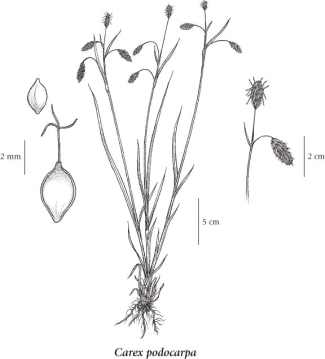Carex podocarpa R. Br.
graceful mountain sedge (shortstalk sedge)
Cyperaceae (Sedge family)
Introduction to Vascular Plants
graceful mountain sedge (shortstalk sedge)
Cyperaceae (Sedge family)
Introduction to Vascular Plants
Species Information
General:
Perennial, tufted herb from short, stout rhizomes; stems 15-40 cm tall, exceeding the leaves.
Leaves:
Sheaths purplish-red towards the bases; blades flat, 2-6 mm wide, the lower ones much reduced.
Flowers:
Spikes 2 to 5, the terminal ones with male flowers, the lower spikes 1 to 4, with female flowers, 1-2 cm long, short-stalked, erect, except the lowermost often spreading; bracts subtending the spikes sheathless, bristlelike to leaflike, shorter to longer than the inflorescence.
Fruits:
Perigynia egg-shaped, flattened, 3-3.5 mm long, 1.8-2 mm wide, reddish-brown to purple, nerveless, the beaks obscure, less than 0.5 mm long; female scales lanceolate, nearly as long and wide as the perigynia, pointed at the tips, reddish-black, with light brown margins; stigmas 3; achenes 3-angled, 1.2-1.5 mm long.
Illustration

If more than one illustration is available for a species (e.g., separate illustrations were provided for two subspecies) then links to the separate images will be provided below. Note that individual subspecies or varietal illustrations are not always available.
Illustration Source: The Illustrated Flora of British Columbia
Ecology
Ecological Framework for Carex podocarpa
The table below shows the species-specific information calculated from
original data (BEC database) provided by the BC Ministry of Forests and Range.
(Updated August, 2013)
The table below shows the species-specific information calculated from
original data (BEC database) provided by the BC Ministry of Forests and Range.
(Updated August, 2013)
| Site Information |
Value / Class |
||
|
Avg |
Min |
Max |
|
| Elevation
(metres) |
1763 | 32 | 2562 |
| Slope
Gradient (%) |
20 | 0 | 244 |
|
Aspect (degrees) |
238 | 0 | 360 |
| Soil
Moisture Regime (SMR) [0 - very xeric; 4 - mesic; 8 - hydric] |
3 | 1 | 8 |
| Modal
Nutrient Regime
Class |
D | ||
| #
of field plots species was recorded in: |
259 | ||
| Modal
BEC Zone Class |
ESSF | ||
|
All BEC Zones (# of stations/zone) species was recorded in |
AT(37), BAFA(73), ESSF(84), ICH(1), IDF(14), IMA(3), MH(1), MS(4), SBS(4), SWB(27) | ||
|
Source:
Klinkenberg 2013
|
|||
Habitat and Range
Mesic to wet meadows, streambanks and seepage areas in the subalpine and alpine zones; frequent in N BC; amphiberingian, N to AK, YT and NT, E to W AB and S to MT, ID and NE; E Asia.Status Information
Synonyms
Synonyms and Alternate Names:
Carex behringensis C.B. Clarke
Carex beringensis
Carex montanensis L.H. Bailey
Carex venustula T. Holm